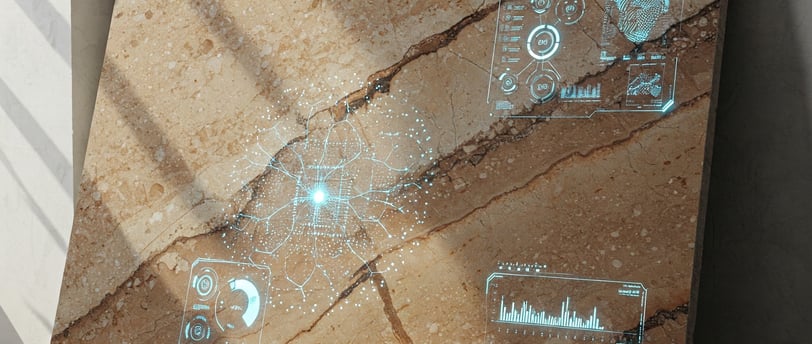The Smart Slab: How AI and Machine Learning are Reshaping the Natural and Engineered Stone Industry
NATURAL STONES
Yuvraj Singh
5/3/20253 min read


The stone industry, known for marrying the timeless beauty of natural materials with the precision of engineered surfaces, is undergoing a significant technological transformation. Artificial Intelligence (AI) and Machine Learning (ML) are no longer futuristic concepts but practical tools being implemented across the value chain, revolutionizing everything from quarrying and manufacturing to how businesses connect with clients and consumers.
From Quarry to Countertop: AI in Manufacturing Operations
The factory floor is where AI's impact is perhaps most tangible:
Flawless Quality, Automatically: Forget subjective manual inspections. AI-powered computer vision systems are now the industry's sharpest eyes. High-resolution cameras scan slabs in real-time, detecting minute cracks, colour variations, or pattern inconsistencies in both natural marble and engineered quartz with superhuman speed and accuracy. AI algorithms grade materials objectively and even match intricate veining patterns across multiple slabs for seamless, high-end installations.
Predicting Problems, Preventing Downtime: Stone processing machinery works hard. AI-driven predictive maintenance uses sensors to monitor equipment health (vibrations, temperature). By analysing this data, AI can forecast potential breakdowns before they happen, allowing manufacturers to schedule maintenance proactively. This drastically cuts expensive unplanned downtime and extends the life of critical machinery.
Optimizing Every Cut: Natural stone is precious, and engineered materials require precise resource management. AI optimizes cutting patterns on slabs to maximize yield and minimize waste. It analyses production workflows to identify bottlenecks, ensuring smoother, faster, and more cost-effective operations.
Rise of the Robots: AI is guiding robotic arms to perform repetitive or strenuous tasks like cutting complex shapes with waterjets or lasers, polishing surfaces to a perfect sheen, and carefully sorting finished pieces, enhancing precision and improving worker safety.
Building Stronger Business Connections (B2B)
AI isn't just improving the product; it's streamlining how businesses operate and interact:
Smarter Supply Chains: From forecasting demand for specific stone types to optimizing delivery routes and managing inventory across locations, AI brings predictive power and efficiency to the complex stone supply chain.
Intelligent Pricing & Sales: AI tools help businesses analyse market data and material characteristics to set competitive prices and generate accurate quotes quickly. They can also identify and prioritize high-potential B2B leads (architects, developers, fabricators), allowing sales teams to focus their efforts effectively.
Tailored B2B Support: AI platforms can help B2B clients select the perfect stone by analysing project requirements against vast databases of material properties, durability data, and aesthetic characteristics.
Designing the Dream Space: Enhancing the Consumer Journey (B2C)
For the end customer, AI is making the selection process more intuitive and engaging:
Visualize Before You Buy: AI-powered Augmented Reality (AR) is a game-changer. Customers can use their phones to see exactly how that Calacatta marble countertop or terrazzo-look engineered stone floor will look in their own room, removing guesswork and boosting confidence.
Personalized Curation: Overwhelmed by choices? AI can act as a virtual design assistant, analysing a customer's style preferences and budget to recommend suitable stone options.
Instant Support: AI chatbots provide 24/7 answers to common customer questions about product care, availability, and more, improving service responsiveness.
The Cutting Edge: What's Next?
The integration of AI continues to evolve. We're seeing advancements in:
Generative Design: AI creating entirely new, optimized stone patterns and application designs.
Material Science: AI analysing geological data or material scans to discover new resources or properties.
Sustainability: AI helping to minimize energy and water usage in processing.
Enhanced Safety: AI monitoring work environments to prevent accidents.
Conclusion: Embracing the Intelligent Future
The adoption of AI and ML is rapidly moving from a competitive advantage to a necessity in the stone industry. Businesses leveraging these technologies benefit from increased operational efficiency, superior product quality, significant cost savings, reduced waste, and ultimately, a more satisfying experience for their B2B partners and B2C customers. The future of stone is not just about its inherent beauty or engineered resilience; it's about the intelligence shaping its journey from source to final space.